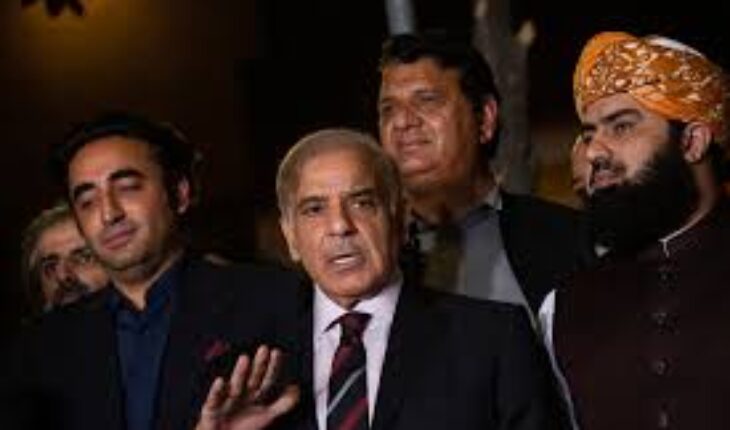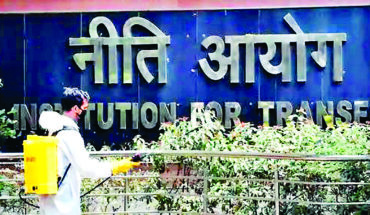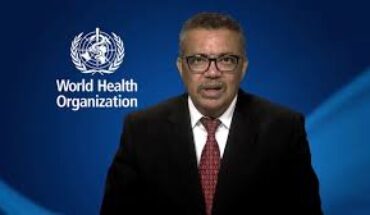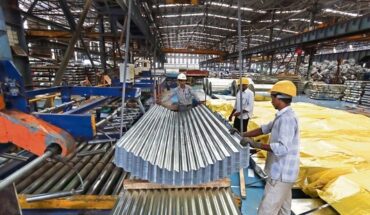Under the invisible umbrella of the uniform, Shahbaz Sharif begins his second innings as the prime minister of Pakistan this week in Islamabad. Sharif of the Pakistan Muslim League-Noon (PML-N) and Bhutto-Zardari’s Pakistan People’s Party (PPP) have formed a strong coalition. Yet, it is difficult to predict whether the new government would be able to usher in any substantial reforms in the country’s sick financial system.
An Islamabad-based think tank and advisory firm, Tabadlab, has issued a stark warning about Pakistan’s debt situation, describing it as a “raging fire” that has become unsustainable, as per a Bloomberg report. This assessment is more severe than that of the International Monetary Fund (IMF), which had previously deemed the country’s dues as “borderline” manageable, according to a 68-page report by Tabadlab.
It is being rightly asked whether the rich and powerful Pakistanis within their own country as well as in the developed first world are known for their huge wealth and fairy-tale lifestyle could resolve the country’s perennial financial challenges.
With their huge wealth and financial resources, it is being stated that if they decide to bail out their country, Pakistan does not require charity either from China or the financial institutions like the International Monetary Fund (IMF) or even the brother Muslim countries in the Gulf.
The country’s ruling elite comprises serving as well as retired defence officers, senior civil servants, judges of high courts and Supreme Court and politicians representing both the ruling alliances as well as the Opposition. They have introduced such favourable laws related to the country’s citizenship to enjoy nationalities in as many as 21 countries; thus enabling them to enjoy the money amassed in Pakistan to be a part of the richi-rich of the first world.
For a Pakistani, if could amass wealth by cheating brother citizens back home, can get citizenship in the countries, including the USA, U.K., France, Italy, Switzerland, Canada, Australia and many other countries.
These ‘bold’ and ‘courageous’ having no inhibition in cheating their fellow countrymen, enjoy a lifestyle causing much envy even to the rich elite in the West. Back home, Pakistan is facing an unprecedented financial crisis depending upon IMF loans for meeting its needs to import oil and gas. The ruling elite even having western education does not hesitate in seeking charity from the brother Islamic countries such as Saudi Arabia and UAE.
According to estimates, billions of the US dollars, obtained from various sources, including the Chinese assistance, are being quietly siphoned off to meet the cost of education of the children of the ruling elite and also to known or unknown off-shore accounts.
Exit of US from Kabul
The political crisis in Afghanistan during the past three decades, the USSR’s intervention, promoting radical Islam with American and Arab funds and finally joining “the war against terror”, has been a financial bonanza for the Pakistani army and its proxies. The situation, however, has undergone paradigm changes following the setting up of the Taliban government. The inflow of dollars has suddenly stopped causing financial hardships to the common people in the country.
Meanwhile, the Chinese too have become reluctant to continue their financial assistance, especially for the China-Pakistan Economic Corridor (CPEC). It is being believed that Pakistanis have grabbed most of the assistance to the tune of USD 50 billion received from China during the past one decade. The situation had worsened during the tenure of Prime Minister Imran Khan, when he asked for revision of the exorbitant interest rates being levied by Beijing.
A Unique Economic Model
Since its inception, the Pakistani ruling elite comprising powerful landlords, top echelon of army and civil services, and its political parties have evolved a unique system of governance under an Islamic ideology. The frequent use of religion and radicalization of masses helped the army to legitimize its rule.
Its military dictators from Ayub Khan, Zia-ul-Haq to Pervez Musharraf have been ruling the country with the tacit approval of Washington.
During this period, the military leadership has also nurtured a ‘friendly’ political class comprising Z.A. Bhutto, Nawaz Sharif and Imran Khan under various political banners, such as Pakistan Peoples’ Party (PPP), Pakistan Muslim League-Noon (PML-N) and Pakistan Tehreek-i-Insaf (PTI). Also, the GHQ promotes and patronizes regional parties in Sindh, Baluchistan such as MQM to serve as its proxies.
In the 1960s and early 1970s, Baluchistan was a hotbed of political activity, and many Baloch leaders and student activists were in the thrall of leftwing politics. They took an active role in politics, forming the provincial government in Baluchistan under the platform of the National Awami Party (NAP). Interestingly, the Pakistani army as well as Iranian clergy were opposed to the secular dimension of Baloch politics. They worked together to radicalize society. The extremists, thus became a formidable force, could not be defeated by genuine secular political forces. In recent years, the madarasas being funded having links with terrorists have mushroomed in Balochistan.
Wealthy Generals
It is difficult to state or estimate how much wealth is being siphoned off by army generals and politicians from the cash-starved country. The military dictator, Pervez Musharraf, who died in Dubai had amassed more than two billion US dollars and huge properties in Dubai, London and cities in Pakistan. Similarly, erstwhile army chief Qamar Jawed Bajwa, reportedly has helped his family enriched by billions of US dollars. The assets of the general’s family amount to Rs 12.7 billion, which includes an international business, multiple foreign properties and capital, commercial plazas and properties, farmhouses, and residential real estate throughout the major cities of Pakistan.
The politicians too have grabbed the country’s resources. In 2021, Nawaz Sharif, a three-time Pakistani PM, the elder brother of Shehbaz Sharif, has an estimated net worth of at least US$31 million. It rose to US$1.8 billion in 2023, when detailed financial data was made available.
Similarly, the wealth of the Zardari-Bhutto family is being discussed across the continents. The Bhutto family owns huge lands in the Larkana district of Sind. The government prosecutors have alleged that their Swiss bank accounts contain £740 million. Zardari also bought a neo-Tudor mansion and estate worth over £4 million in Surrey, England, and in London, which are estimated to be worth about $200 million, and assets in Pakistan valued at over $1.5 billion.
Jobs for Non-commissioned Officers
The senior military officers get high civilian positions, including diplomatic assignments, and also earn huge money by indulging in purchase of arms and ammunition. Apart from the widespread corruption among generals, non-commissioned officers are being given opportunities to earn profits by joining the companies owned by the army such as for manufacturing and selling cornflakes, breads, biscuits, cement, and fertilizers. The military also runs airlines, logistics companies, banks, and insurance services. The Pakistan Army’s defense industry includes, local suppliers, Cavalier Group, Daudsons Armoury, Global Industrial Defence Solutions (GIDS), Heavy Industries Taxila, Heavy Mechanical Complex, Integrated Dynamics
The Pakistan Army’s private sector includes, Advance Systems (Pvt) Ltd, Gujranwala, Afridi Arms, AKSA Solutions Development Services (Pvt) Ltd, Islamabad, Alpine Industries (Pvt) Ltd, Lahore, And Or Logic Pakistan (Pvt) Ltd, Islamabad, Alsons Industries (Pvt) Ltd, Karachi and Automobile Corporation of Pakistan (Pvt) Ltd, Karachi.
The Pakistan Army also runs commercial projects that generate nearly US$26.5 billion in annual revenue. These projects are run under charitable banners, including Fauji Foundation, Asakari Foundation, Shaheen Foundation, Baharia Foundation, Army Welfare Trust and Defence Housing Authorities
With the details available, there is little doubt that Pakistan does not need charity or much financial assistance, but a system of governance accountable to the people. In spite of the new coalition government now being installed in Islamabad, there is little hope of improving the economy of the country and a check on the loot of the government funds.
Gopal Misra has been associated with national and international media. His books on journalism and geo-politics have been well-appreciated. Views are personal.





